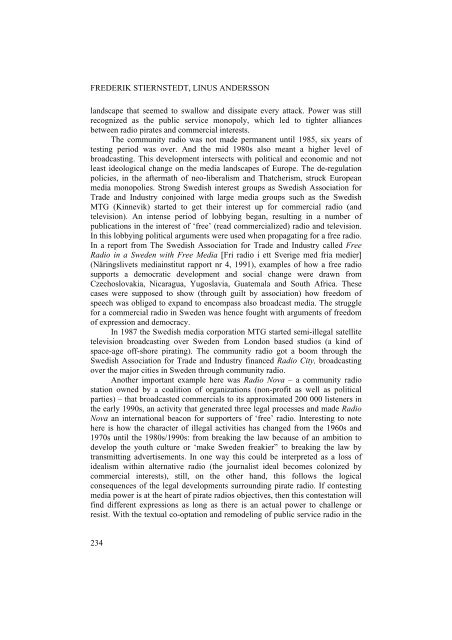culture, subculture and counterculture - Facultatea de Litere
culture, subculture and counterculture - Facultatea de Litere
culture, subculture and counterculture - Facultatea de Litere
You also want an ePaper? Increase the reach of your titles
YUMPU automatically turns print PDFs into web optimized ePapers that Google loves.
FREDERIK STIERNSTEDT, LINUS ANDERSSON<br />
l<strong>and</strong>scape that seemed to swallow <strong>and</strong> dissipate every attack. Power was still<br />
recognized as the public service monopoly, which led to tighter alliances<br />
between radio pirates <strong>and</strong> commercial interests.<br />
The community radio was not ma<strong>de</strong> permanent until 1985, six years of<br />
testing period was over. And the mid 1980s also meant a higher level of<br />
broadcasting. This <strong>de</strong>velopment intersects with political <strong>and</strong> economic <strong>and</strong> not<br />
least i<strong>de</strong>ological change on the media l<strong>and</strong>scapes of Europe. The <strong>de</strong>-regulation<br />
policies, in the aftermath of neo-liberalism <strong>and</strong> Thatcherism, struck European<br />
media monopolies. Strong Swedish interest groups as Swedish Association for<br />
Tra<strong>de</strong> <strong>and</strong> Industry conjoined with large media groups such as the Swedish<br />
MTG (Kinnevik) started to get their interest up for commercial radio (<strong>and</strong><br />
television). An intense period of lobbying began, resulting in a number of<br />
publications in the interest of ‘free’ (read commercialized) radio <strong>and</strong> television.<br />
In this lobbying political arguments were used when propagating for a free radio.<br />
In a report from The Swedish Association for Tra<strong>de</strong> <strong>and</strong> Industry called Free<br />
Radio in a Swe<strong>de</strong>n with Free Media [Fri radio i ett Sverige med fria medier]<br />
(Näringslivets mediainstitut rapport nr 4, 1991), examples of how a free radio<br />
supports a <strong>de</strong>mocratic <strong>de</strong>velopment <strong>and</strong> social change were drawn from<br />
Czechoslovakia, Nicaragua, Yugoslavia, Guatemala <strong>and</strong> South Africa. These<br />
cases were supposed to show (through guilt by association) how freedom of<br />
speech was obliged to exp<strong>and</strong> to encompass also broadcast media. The struggle<br />
for a commercial radio in Swe<strong>de</strong>n was hence fought with arguments of freedom<br />
of expression <strong>and</strong> <strong>de</strong>mocracy.<br />
In 1987 the Swedish media corporation MTG started semi-illegal satellite<br />
television broadcasting over Swe<strong>de</strong>n from London based studios (a kind of<br />
space-age off-shore pirating). The community radio got a boom through the<br />
Swedish Association for Tra<strong>de</strong> <strong>and</strong> Industry financed Radio City, broadcasting<br />
over the major cities in Swe<strong>de</strong>n through community radio.<br />
Another important example here was Radio Nova – a community radio<br />
station owned by a coalition of organizations (non-profit as well as political<br />
parties) – that broadcasted commercials to its approximated 200 000 listeners in<br />
the early 1990s, an activity that generated three legal processes <strong>and</strong> ma<strong>de</strong> Radio<br />
Nova an international beacon for supporters of ‘free’ radio. Interesting to note<br />
here is how the character of illegal activities has changed from the 1960s <strong>and</strong><br />
1970s until the 1980s/1990s: from breaking the law because of an ambition to<br />
<strong>de</strong>velop the youth <strong>culture</strong> or ‘make Swe<strong>de</strong>n freakier” to breaking the law by<br />
transmitting advertisements. In one way this could be interpreted as a loss of<br />
i<strong>de</strong>alism within alternative radio (the journalist i<strong>de</strong>al becomes colonized by<br />
commercial interests), still, on the other h<strong>and</strong>, this follows the logical<br />
consequences of the legal <strong>de</strong>velopments surrounding pirate radio. If contesting<br />
media power is at the heart of pirate radios objectives, then this contestation will<br />
find different expressions as long as there is an actual power to challenge or<br />
resist. With the textual co-optation <strong>and</strong> remo<strong>de</strong>ling of public service radio in the<br />
234












